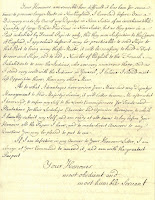 In the 1720s, the newly-formed Kingdom of Great Britain was in a bit of a fix. Although the Royal Navy was the largest in the world, the British Empire kept embroiling itself in wars with either France, Spain, or an alliance of both. This meant that the British fleet had to be continually repaired and replaced as damage accumulated. As a result, ship timber was at a premium during the early 18th century for England, who had nearly exhausted its native supply. Luckily, its North American colony of New Hampshire was a veritable treasure trove of white pine trees, the preferred wood for warship masts and spars.
In the 1720s, the newly-formed Kingdom of Great Britain was in a bit of a fix. Although the Royal Navy was the largest in the world, the British Empire kept embroiling itself in wars with either France, Spain, or an alliance of both. This meant that the British fleet had to be continually repaired and replaced as damage accumulated. As a result, ship timber was at a premium during the early 18th century for England, who had nearly exhausted its native supply. Luckily, its North American colony of New Hampshire was a veritable treasure trove of white pine trees, the preferred wood for warship masts and spars. The challenge was that New Hampshire was also in a period of expansion into and settlement of the "wilderness" beyond Portsmouth, which included areas technically belonging to the king. As the colonists expanded, they cleared a path through the forest, often felling white pines that belonged to the crown. In response, the British government appointed a Surveyor General of the His Majesty's Woods, who was tasked with the thankless and sometimes dangerous duty of hunting down colonial poachers and bringing them to justice.
The challenge was that New Hampshire was also in a period of expansion into and settlement of the "wilderness" beyond Portsmouth, which included areas technically belonging to the king. As the colonists expanded, they cleared a path through the forest, often felling white pines that belonged to the crown. In response, the British government appointed a Surveyor General of the His Majesty's Woods, who was tasked with the thankless and sometimes dangerous duty of hunting down colonial poachers and bringing them to justice.Here at Rauner, we have a small slice of this interesting story represented in three original manuscripts from the era. The first is a copy of an act, passed in 1735, that allowed the Surveyor General and his deputies exceptional leeway in accusing people of stealing white pines: only circumstantial evidence was necessary to bring individuals before the court.
 Despite these expanded powers, the British Admiralty remained concerned enough about their mast supply to send a brief but portentous inquiry on April 28, 1742, to David Dunbar, the Surveyor General of the King's Wood. They wanted to know what he had been doing since his 1728 appointment and how he had been of benefit to the navy during that time. Dated April 30, 1742, only two day's after the Admiralty's letter, Dunbar's hasty response is telling. His six-page report chronicles fourteen years of forest-related activity in New England, including his clear frustration with Jonathan Belcher, the governor of New Hampshire at the time. According to Dunbar, Belcher did everything within his power to restrict or impede the Surveyor General and his deputies from executing their duties while encouraging the colonists to use the forest for their own ends. Dunbar emphasizes that his enforcement of the law "made all
Despite these expanded powers, the British Admiralty remained concerned enough about their mast supply to send a brief but portentous inquiry on April 28, 1742, to David Dunbar, the Surveyor General of the King's Wood. They wanted to know what he had been doing since his 1728 appointment and how he had been of benefit to the navy during that time. Dated April 30, 1742, only two day's after the Admiralty's letter, Dunbar's hasty response is telling. His six-page report chronicles fourteen years of forest-related activity in New England, including his clear frustration with Jonathan Belcher, the governor of New Hampshire at the time. According to Dunbar, Belcher did everything within his power to restrict or impede the Surveyor General and his deputies from executing their duties while encouraging the colonists to use the forest for their own ends. Dunbar emphasizes that his enforcement of the law "made all  the Country our Enemys" and meant that "many Insults were offered to us, and even some Attempts upon our Lives." This account of a beleaguered British government official highlights the discontent that was already growing among the colonies towards Great Britain thirty years before the Revolutionary War. In particular, it serves as a harbinger of the New Hampshire Pine Tree Riot of 1772, one of the many immediate precursors to the colonial rebellion.
the Country our Enemys" and meant that "many Insults were offered to us, and even some Attempts upon our Lives." This account of a beleaguered British government official highlights the discontent that was already growing among the colonies towards Great Britain thirty years before the Revolutionary War. In particular, it serves as a harbinger of the New Hampshire Pine Tree Riot of 1772, one of the many immediate precursors to the colonial rebellion.To see these handwritten documents, come to Rauner and ask for MSS 738327 and MSS 735103.
No comments :
Post a Comment